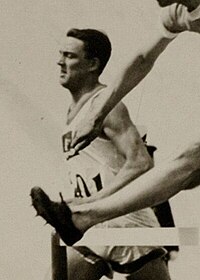Alfred Joseph Watson (26 May 1907 – 23 August 1992) was an Australian track and field athlete who competed in the 1928 Summer Olympics and in the 1936 Summer Olympics.[1]
 | ||
| Medal record | ||
|---|---|---|
| Men's athletics | ||
| Representing | ||
| British Empire Games | ||
| 1938 Sydney | 4×110 yards | |
Family life
editThe son of Thomas Watson (1866-1925),[2] and Flora Henrietta Watson (1874-1950), née Dowell,[3][4] Alfred Joseph Watson was born on 26 May 1907. His eldest brother, Russell Henry Watson (1892–1941), was an Australian amateur middle distance champion, who held titles in the mile, half-mile, and 440 hurdles.[5] Both Alf and his older brother, Edward, attended Caulfield Grammar School from 1917 to 1919.[6]
Early years
editAlf then attended Ivanhoe Grammar School,[7] for whom he sprinted and competed in the high jump;[8] In addition to being a fine Australian Rules footballer (a member of the school's First XVIII from 1922 to 1924), he also played cricket with the school's First XI from 1921 to 1924,[9] captaining the team in 1923 and 1924, and winning the Associated Grammar Schools' batting average in 1924 (as a consequence of which he was awarded an "exhibitioner's ticket" to the Melbourne Cricket Club).[10]
Competition
editIn 1928 he was eliminated in the first round of the 110 metre hurdles event as well as of the 400 metre hurdles competition.
Eight years later he was again eliminated in the first round of both the 110 metre hurdles contest and the 400 metre hurdles event.
At the 1938 Empire Games he was a member of the Australian relay team which won the bronze medal in the 4×110 yards competition. In the 440 yards hurdles contest he finished fourth.
He announced his retirement from competitive athletics in November 1938.[11]
See also
editFootnotes
edit- ^ Evans, Hilary; Gjerde, Arild; Heijmans, Jeroen; Mallon, Bill; et al. "Alf Watson". Olympics at Sports-Reference.com. Sports Reference LLC. Archived from the original on 4 December 2016.
- ^ Deaths: Watson, The Argus, (Monday, 22 June 1925), p.1
- ^ A Hide and Skin Trader's Estate: Family Contract to Carry On, The Age, (Wednesday, 9 December 1925), p.17.
- ^ Deaths: Watson, The Argus, (Tuesday, 30 May 1950), p.11.
- ^ Former Champion Runner Dead, The Mercury, (Monday, 17 November 1941), p.7.
- ^ Webber, (1981), p.319; Wilkinson, (1997), pp.56, 58.
- ^ Notes from Classroom and Playing Field: Olympic Representative, The Argus, (Thursday, 14 May 1936), p.7.
- ^ School Sports: Associated Grammar Schools, The Argus, (Saturday, 4 November 1922), p.21. and Associated Grammar Sports on M.C.C. Ground: A. Watson (Ivanhoe Grammar) in the high jump for boys under 16, The Argus, (Tuesday, 14 November 1922), p.7. and Grammar Schools' Sports, The Argus, (Tuesday, 14 November 1922), p.4.
- ^ An Incident in the Cricket Match between Ballarat Grammar School and Ivanhoe Grammar School: Watson (Ivanhoe) batting and Bolte (Ballarat) wioket-keeping, Table Talk, (Thursday, 26 April 1923), p.24: note that the wicket-keeper was, most likely, Henry Bolte, a student at BGS at that time.
- ^ Schools & Colleges: Associated Grammar Schools, Table Talk, (Thursday, 2 October 1924), p.28; "Referee", "Australia's Olympic Hope: Watson is Probable World Beater", The Sporting Globe, (Saturday, 6 April 1929), p.4.
- ^ 1,500 Will Compete, The Argus, (Friday, 4 November 1938), p.19.
References
edit- Wilkinson, Ian R. (1997). The Fields At Play - 115 Years of Sport at Caulfield Grammar School 1881-1996. Playright Publishing. ISBN 0-949853-60-7.
- Webber, Horace (1981). Years May Pass On... Caulfield Grammar School, 1881-1981. Centenary Committee, Caulfield Grammar School, (East St Kilda). ISBN 0-9594242-0-2.
External links
edit- Alfred Joseph Watson at the Commonwealth Games Federation (archived)
- Alfred Joseph Watson at Olympics.com
- Alfred J. Watson at the Australian Olympic Committee
- Alf Watson at Olympedia (archive)
- Alfred 'Alf' Watson at Australian Athletics Historical Results
- Taylor, P., "These Days of Sport: Master of Style", The Argus, (Saturday, 7 March 1936), p.26.
- Hillhouse, A., "Story of Alf Watson: Brilliant Athlete for Twenty Years", The Junior Argus, (Thursday, 26 March 1936), p.7.
- Australia's Champions: A.J. Watson, The Sydney Morning Herald, (Friday, 27 March 1936), p.15.
- Olympic Hurdler's Success, The Argus, (Monday, 23 November 1936), p.7. and Yates's Good Time for 100 Yards Run, The Argus, (Monday, 23 November 1936), p.7.
- Sports Flashes from Many Fields: Hurdles Champion, The Canberra Times, (Monday, 13 September 1937), p.3.